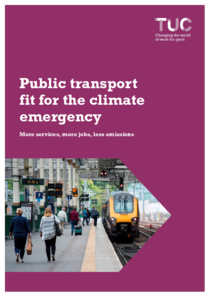Public transport fit for the climate emergency: More services, more jobs, less emissions

TUC - London
2023
120 p.
public transport ; climate change ; gas emission ; employment ; trade union document
Transport
English
Bibliogr.;Statistics
"Public transport has a vital role to play in decarbonising our economy and safeguarding a planet fit for our children and grandchildren to live in. Improving our public transport is not only about protecting our environment, it's also about the quality of life in communities all over England and Wales.
Decent public transport is essential for access to work across the economy, it also means that grandparents get to see their grandkids, and working parents get home earlier to spend time with their children, we call get to share in culture and entertainment. It means that teenagers can get to school and adult learners can access training that can transform lives. It means people on low incomes can visit town centre shops, and businesses can get the customers they need to reinvigorate local economies.
For too long, people have had to put up with inadequate services. All too often, buses are expensive and infrequent, with routes that get cut because the private providers are driven more by private profit than by a public service ethos. Train services are expensive and chaotic, with services frequently delayed – when they're not cancelled at short notice due to staffing levels cut to the bone and maintenance services outsourced and short-staffed. The transport workforce has suffered alongside passengers. Years of frozen pay and attacks on terms and conditions are a poor reward for those on the frontline during the pandemic.
Public transport fit for the climate emergency sets out a plan for the investment in public transport throughout England and Wales that has long been needed. From town and cities, to villages and rural communities, this plan would mean more services, new routes, cheaper fares and modern fleets of low emission vehicles. This radical transformation must be funded by central government and delivered by local and regional transport authorities. And we should all get a say on the transport needs where we live and how this investment is allocated. Passengers, local communities, and transport workers should all be consulted on public transport improvement plans where they live and work.
The investment proposed by this report would achieve the transition to low-carbon transport needed to honour our climate action agreements with the rest of the world. It would generate green and sustainable economic growth in regions across England and Wales. And it would directly create hundreds of thousands of jobs in the transport sector, plus many more in construction and manufacturing supply chains.
As well as cheaper, more extensive and reliable buses, trams and trains, we would have cleaner air to breath. And the roads would be less congested for all road users.
To make sure that every community benefits as fully as possible, with ongoing investment and the best value fares, our public transport should be publicly owned.
The climate emergency means we must act. But the benefits of affordable, reliable and extensive public transport are so great that we should want to anyway – for the lower cost of living and higher quality of life it will bring. This report lays out the blueprint for 21st century public transport, all that's left is to build it."
Digital
The ETUI is co-funded by the European Union. Views and opinions expressed are however those of the author(s) only and do not necessarily reflect those of the European Union or the ETUI.